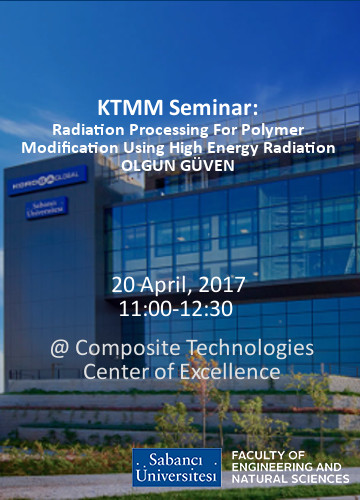KTMM Seminar:Radiation Processing For Polymer Modification
Merhabalar,
20 Nisan Perşembe, 11:00-12:30 saatleri arasında Teknopark Kompozit Araştırma Merkezinde, Prof.Olgun Güven "Radiation Processing For Polymer Modification Using High Energy Radiation" başlıklı seminer verecektir.
Sabancı Üniversitesi -Teknopark Gidiş
Araç Hareket Saati : 10:50Araç Hareket Alanı : Sunum Binası Önü
Teknopark- Sabancı Üniversitesi
Araç Hareket Saati : 13:00
Araç Hareket Alanı : KTMM Binası Önü

Speaker: Olgun Güven
Title: Radiation Processing For Polymer Modification
Date/Time: Thursday, APRIL 20, 2017 11:00 – 12:30
Place: Teknopark- KTMM
Abstract:
Radiation processing of materials, in other words controlling the chemical effects of ionizing radiation on irradiated materials to develop and manufacture various industrial products has shown a continuous evolution since the availability of first reliable industrial scale Co-60 gamma irradiators and electron accelerators. Today there are more than 350 industrial scale Co-60 gamma irradiators, 20% of which with more than 1 million Curie activity and more than 1700 electron accelerators in 300 keV-10 Mev energy range with 1-100 MW power used for various applications all around the world. Two-thirds of [1] these 1700 high current, high energy Electron Beam facilities are used by polymer, plastics and rubber industries exclusively for crosslinking purposes. Typical industrial applications include but not limited to: i) crosslinking of wire and cable jacketing, ii) production of heat shrinkables, iii) wraps and food packaging films, iv) polyethylene foams. Crosslinking effect of ionizing radiation has been used to increase the green strength of rubber, for manufacturing various automotive parts by crosslinking of polyamides, and crosslinking of water distribution pipes. The so-called adverse effect of radiation, namely chain scission has been utilized in lithography, manufacturing of micromachines and plant growth promoters. In health-care, enhancement of mechanical properties of Ultra High Molecular Weight Polyethylene used in the manufacturing of hip and knee prosthesis, preparation of sterile hydrogel burn and wound dressings have been achieved by radiation-induced crosslinking process. Poly(tetrafluoroethylene), cellulosics and marine based polysaccharides are some of the most important synthetic and natural polymers benefiting the degradation effect of radiation for diverse aqpplications.
Radiation curing of polymeric composites has been achieved by high energy EB systems for aerospace, military and automotive industry applications whereas curing of coatings and printing inks has opened the way for the development of low energy self-shielded electron accelerators. These type of low energy, self-shielded, low cost electron accelerators started to find increasing use for the preparation of radiation-grafted polymers [2]. One of the established applications is the production of battery separators, the same principle has been considered in the preparation of fuel cell and supercapacitor membranes[3]. Specialty adsorbents prepared by radiation-induced grafting of selected monomers on low cost, abundant synthetic or natural polymers have found increasing use for environmental applications either to remove some hazardous pollutants or collecting valuable metal ions from aqueous systems such as uranium.
Biograph:
Dr. Olgun Güven specializes in the field of application of radiation and polymer chemistry. During his professional career, Dr. Olgun Güven published more than 300 articles in internationally peer reviewed journals in the field of grafting polymers and radiation induced synthesis and polymerization. He also authored five books and three book chapters. He is also participated in numerous seminars, symposiums and conferences as the invited speaker all around the world.